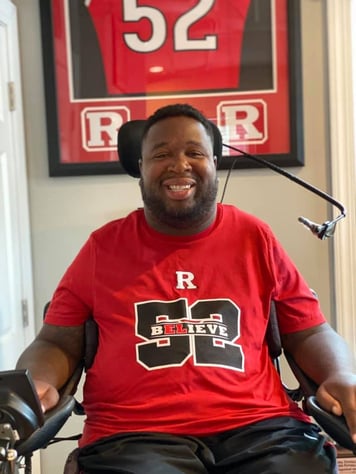Hope Happens Here: Eric LeGrand
Join Our Movement
What started as an idea has become a national movement. With your support, we can influence policy and inspire lasting change.
Become an Advocate
Redefining Goals
In fall 2013, LeGrand joined forces with the Reeve Foundation to form his own fundraising effort called Team LeGrand.
“I wanted to use my story as a platform to continue Christopher’s name and the Reeve Foundation’s incredible work,” says LeGrand. “I’m very excited to be part of the Reeve Foundation and honored to be at the forefront of trying to raise money to find a cure.”
True to form, LeGrand set ambitious goals for 2020. His Believe 2020 plan was to raise $1 million in one year in honor of the ten-year anniversary since his injury. Then COVID changed everything.
“In some ways, this pandemic is kind of like paralysis. One minute everything is great, and then the next everything is taken away from you,” says LeGrand. “You can’t do this, you can’t do that, and now you need to figure out another way, a new path forward.”
LeGrand pivoted his plan and set new goals. His 10th annual A Walk to Believe went virtual and drew more than 1,500 participants from 50 states, 2 U.S. territories, and ten countries, raising a record-breaking $190,000. Inspired by the incredible turnout, LeGrand plans to make livestreaming the event for global participation an annual feature moving forward.
“So many lessons can be learned from sitting back and reflecting and trying to understand and listen,” says LeGrand. “One potentially good thing from the pandemic is people are taking more time to reflect on priorities.”
LeGrand feels the world could learn a lot from the paralysis community about the importance of patience and being able to pivot from one plan to another without getting too down on yourself.
“I have such an appreciation for my life now because of all the things I can’t do, and the things that I can do, I don’t take for granted.”
Using Lessons Learned
It’s not surprising that LeGrand has used his time at home during the pandemic to start a couple of new business and fundraising ventures.
In April, LeGrand started working with a new app called Forbeto, a shorted version of “for a better tomorrow.” The platform helps local businesses promote current offers through targeted ads. In exchange for listening to a couple of minutes of ads two times a month, ap users get money put into an account that can be donated to many charities.
“The platform helps both business and charities that are struggling because of the pandemic,” says LeGrand. “It is ideal for people who may not have the money to donate themselves but can give a little time in exchange for money to make a donation. Right now, we are just in New Jersey, but we plan to expand across the country.”
LeGrand has also dreamed of owning his own business, but he never knew exactly what the business would be. In August, after he drank his first cup of coffee ever and loved it, his first business idea started to fall into place. He is now working toward opening a coffee shop in a new downtown development in his hometown of Woodbridge, NJ.
“I said in the middle of this pandemic that I am going to come out better on the other side of this, so that’s my plan,” says LeGrand. “I’ve got a few more things I’m working on, and when 2021 comes rolling around, I’m coming out better than before.”
LeGrand continues, “I will never be upset about this pandemic and what it has canceled for me because it brought me a whole new perspective, and it has inspired me to start my businesses. A lot of stuff is happening right now very fast, so hopefully, in the next 10 years, you’ll find me on top of the world in the business world and on the top of the world in fundraising.”
Looking Ahead
Moving forward, LeGrand wants to continue to look for new partnerships and opportunities to step out of his comfort zone to find new and different ways to draw more attention to the spinal cord injured community and fundraise for Team LeGrand.
“We are getting closer and closer to this cure, and I think we will find it,” says LeGrand. “I’m inspired by all the technological advancements we’ve seen in the last 10 years. Over the next decade, I hope we will see people walking again and regaining function of secondary conditions.”
In the meantime, LeGrand plans to continue to focus his efforts on bringing people together to support each other and paralysis.
“I want to show by example that, with everything going on in the world and the social justice movement, that we are one,” says LeGrand. “No matter what you look like, the color of your skin, or the disability you may have. I want to be able to show that I am an African American who has a disability, and I have brought millions of people together for one cause. Look what I am able to do in my situation. We can all do this.”
